
Sisters is an American family drama television series that aired on NBC for six seasons from May 11, 1991 to May 4, 1996. The series was created by Ron Cowen and Daniel Lipman, who were also the executive producers and showrunners. The show debuted on May 11, 1991 for a seven-episode test run and was subsequently renewed for the 1991 fall schedule.
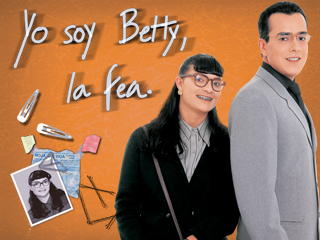
Yo soy Betty, la fea, often referred to simply as Betty, la fea, is a Colombian telenovela written by Fernando Gaitán which was broadcast from 25 October 1999 to 8 May 2001 by RCN. More than a dozen versions of the telenovela have been made in other countries due to the popularity of the plot. American comedy-drama hit Ugly Betty, Mexican telenovela La fea más bella, South African comedy uBettina Wethu, and Indian series Jassi Jaissi Koi Nahin are all based on this Colombian telenovela.

The Evening Star is a 1996 American comedy-drama film. It is a sequel to the Academy Award-winning 1983 film Terms of Endearment starring Shirley MacLaine, who reprises the role of Aurora Greenway, for which she won an Oscar in the original film. Based on the 1992 novel by Larry McMurtry, the screenplay is by Robert Harling, who also served as director.

Aurora Leigh (1856) is an epic poem/novel by Elizabeth Barrett Browning. The poem is written in blank verse and encompasses nine books. It is a first-person narration, from the point of view of Aurora; its other heroine, Marian Erle, is an abused self-taught child of itinerant parents. The poem is set in Florence, Malvern, London and Paris. The work references Biblical and classical history and mythology, as well as modern novels, such as Corinne ou l'Italie by Anne Louise Germaine de Staël and the novels of George Sand. In Books 1-5, Aurora narrates her past, from her childhood to the age of about 27; in Books 6–9, the narrative has caught up with her, and she reports events in diary form. The author styled the poem "a novel in verse", and referred to it as "the most mature of my works, and the one into which my highest convictions upon Life and Art have entered". The scholar Deirdre David asserts that Barrett Browning's work in Aurora Leigh renders her "a major figure in any consideration of the nineteenth-century woman writer and of Victorian poetry in general". John Ruskin called it the greatest long poem of the nineteenth century.
"A Hit Is a Hit" is the 10th episode of the HBO original series The Sopranos. Written by Joe Bosso and Frank Renzulli, and directed by Matthew Penn, it originally aired on March 14, 1999.
"Mergers and Acquisitions" is the 47th episode of the HBO original series The Sopranos and the eighth of the show's fourth season. Its teleplay was written by Lawrence Konner from a story by David Chase, Robin Green, Mitchell Burgess, and Terence Winter. It was directed by Dan Attias and originally aired on November 3, 2002.

The Decameron is a 1971 anthology film written and directed by Pier Paolo Pasolini, based on the 14th-century allegory by Giovanni Boccaccio. It is the first film of Pasolini's Trilogy of Life, the others being The Canterbury Tales and Arabian Nights. Each film was an adaptation of a different piece of classical literature focusing on ribald and often irreligious themes. The tales contain abundant nudity, sex, slapstick and scatological humour.

Story of a Love Affair is a 1950 Italian drama film directed by Michelangelo Antonioni and starring Massimo Girotti and Lucia Bosè. Despite some neorealist background, the film was not fully compliant with the contemporary Italian neorealist style both in its story and image, featuring upper-class characters portrayed by professional actors. Ferdinando Sarmi was, however, a fashion designer rather than a professional actor. Its story was inspired by the James M. Cain novel The Postman Always Rings Twice. In the film, the camera pans the same street corner in Ferrara, the director's native city, that appears in his film Beyond the Clouds forty-five years later. In 1951, the film won the Nastro d'Argento Silver Ribbon Award for Best Original Score and the Special Silver Ribbon for human and stylistic values. Story of a Love Affair was Antonioni's first full-length feature film.

Jewel Robbery is a 1932 American pre-Code romantic comedy heist film, directed by William Dieterle and starring William Powell and Kay Francis. It is based on the 1931 Hungarian play Ékszerrablás a Váci-utcában by Ladislas Fodor and its subsequent English adaptation, Jewel Robbery by Bertram Bloch.

Eager to Live is a 1953 Italian drama film directed by Claudio Gora. In 2008 the film was selected to enter the list of the 100 Italian films to be saved.
Un medico in famiglia is an Italian television series, based on the format of the Spanish series of Telecinco Médico de familia, produced by Publispei and Rai Fiction. The series aired for ten seasons on Rai 1 from 6 December 1998 to 24 November 2016.
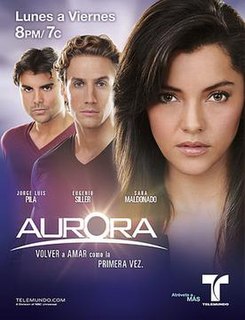
Aurora is a Spanish-language telenovela produced by the United States-based television network Telemundo. It starred Sara Maldonado, Eugenio Siller, and Jorge Luis Pila. As part of the 2010–11 season, Telemundo aired the series from November 1, 2010 to May 20, 2011 weeknights at 8pm/7pm central, replacing El Clon. As with most of its other telenovelas, the network broadcasts English subtitles as closed captions on CC3.
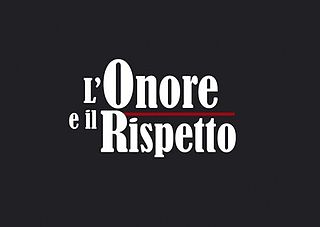
L'onore e il Rispetto is an Italian crime drama broadcast on Canale 5. It is composed of four seasons of six episodes each: the first aired in 2006, the second in 2009 and the third in 2012. The fourth season, initially scheduled for the first months of the year, was broadcast from 1 September 2015. Even before the airing of the said season, Mediaset renewed the series for a fifth season.

Mid-Century Loves is a 1954 Italian anthology historical melodrama film consisting of five segments directed by Glauco Pellegrini, Pietro Germi, Mario Chiari, Roberto Rossellini and Antonio Pietrangeli.

La Madrastra is a Mexican telenovela. It was produced by Televisa and broadcast on Canal de las Estrellas in Mexico from Monday, February 7, 2005 through Friday, July 29, 2005. The program became an unexpected success, garnering ratings in excess of 30 points. Starring Victoria Ruffo and César Évora, who last appeared together in 2000's Abrázame muy fuerte, while Jacqueline Andere, Guillermo García Cantú, Cecilia Gabriela, Martha Julia, René Casados, Sabine Moussier and Sergio Mayer starred as the antagonists and the stellar performances of Eduardo Capetillo, Ana Layevska, Mauricio Aspe, Michelle Vieth, Miguel Ángel Biaggio, Mariana Ríos, José Luis Reséndez, Ana Martín, Margarita Isabel, Patricia Reyes Spíndola and Joaquín Cordero, La madrastra tells the story of María, a woman who lost twenty years of her life after being falsely accused of murder and who returns to Mexico to exact revenge on her husband and friends who abandoned her and to see her beloved children once more.

La dama velata is a 2015 Italian-Spanish mystery-drama television miniseries directed by Carmine Elia. It was produced by Rai Fiction, Lux Vide and Telecinco Cinema, with a budget of about 10 million euros. It is set in Trentino, in the late nineteenth century. In Italy, the series was broadcast on Rai 1 and Rai 1 HD from March 17 to April 16, 2015.
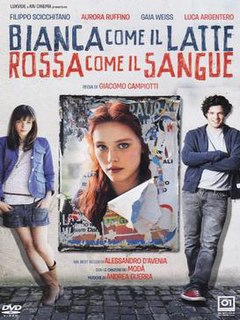
White as Milk, Red as Blood is a 2013 film directed by Giacomo Campiotti, a film adaptation of the novel of the same name by Alessandro D'Avenia. However, the film has significant discrepancies with respect to the novel.
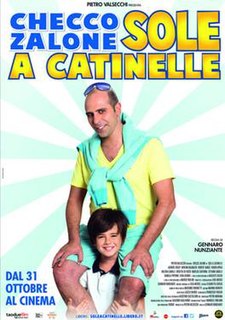
Sole a catinelle is a 2013 Italian comedy film directed by Gennaro Nunziante. The film is the second highest-grossing Italian film in Italy.















